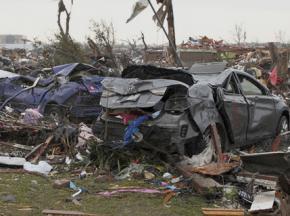Solidarity confronts calamity
Politicians and corporations prefer "charity" after a disaster to allocating adequate resources beforehand, explain and .
MAY 3, 1999, is a date that any Oklahoman who has lived in the state for the past few decades will associate with tragedy. Even younger people in the Sooner state have grown up hearing about the "tornado of the century" and the horrors it brought to the town of Moore, Okla., a suburb of Oklahoma City.
This most powerful and deadly kind of tornado--an F5 according to the ratings in use at the time--had winds of around 319 miles per hour and devastated an area from Chickasha to the southwest through to the southeastern edge of Oklahoma City. The tornado remained on the ground for nearly an hour and a half. Of the 36 people who perished in the outbreak of tornados on that day in 1999, 35 were killed by the F5. It was referred to as "the finger of God" by meteorologists for its sheer destructive force, sucking the very foundation of houses out of the ground.
On May 20 of this year, an EF5 tornado struck Moore. This time, the devastation was even more catastrophic, and the "rescue" effort has now been converted into a "recovery" effort. The death toll from this storm remains at 24, and local first responders report that 95 percent of all people affected, dead or alive, have been accounted for. Of the 24 confirmed dead, 10 were children in public schools.

The two largest businesses in the state, Devon Energy and Chesapeake Energy, have contributed around $1 million each toward relief efforts in the town of Moore. The local media, as expected, is painting this as a noble act of charity in a time of great crisis. However, the reality here is much less kind.
Both corporations are multibillion-dollar entities with operations throughout the state and the country. Their profits have skyrocketed over the past decade as the political narrative shifted toward direct advocacy of homegrown sources of fuel and energy, such as compressed natural gas and oil. The practices that each company has employed to harness these sources are notorious for their destructiveness, posing new and insidious threats to the environment.
The fact that these corporations waited to act until after a monster tornado tore through a major community illustrates the real issue at hand.
On May 19--one day before the monster EF5 tornado leveled Moore--a tornado shredded the small community of Bethel Acres just west of the town of Shawnee. Two people were killed and dozens of homes were swept away by a tornado estimated at EF3 strength. Earlier that day, another EF3 tornado struck the towns of Luther and Carney northeast of Oklahoma City, dealing a devastating to blow to both people and property.
But there was little in the way of relief following these two highly destructive tornados, likely because the national media didn't take enough notice to warrant the "selflessness" of corporate donations.
BUT EVEN setting the discussion of charity aside, the fact that the technology to build practically tornado-proof buildings exists--and that corporations as well as the state legislature refuse to support their construction--is a shameful disgrace, considering the violent weather that Oklahomans regularly confront.
Rather than using taxpayer money to draft legislation to cut teachers' salaries or limit a woman's right to control her own body, state lawmakers should demand that all children across the state have access to a storm-safe shelter. Furthermore, the billions of dollars of profit fleeced by Devon and Chesapeake each year could be used to build public storm shelters for people without access to one.
The current economic system, however, would rather put tornado victims at the mercy of "charities" and the donations of Corporate America, which only lends a hand when it is profitable, convenient or in some way advantageous to the corporation doing the "selfless giving." In Oklahoma, ordinary people, friends, neighbors and complete strangers are conducting the real work of helping and healing a ravaged community, not corporate executives.
Mainstream ideology promotes the idea that we are all products of selfish human nature. If it weren't for the law and other social institutions, we would tear at each other like animals. Yet nearly every time there is a natural disaster, no matter the nation, no matter the culture, humanity pulls together. Stranger helps stranger.
In Oklahoma, we have heard of stories of a man buying as many shovels as could fit in the bed of his truck and giving them to rescue workers for free. Stories of a woman who lost all three of her children while helping two lost little boys find their parents. Stories of a teacher who with her own might held up a collapsing wall at a school and saved several young lives.
Dear friends of ours and fellow travelers of the Oklahoma socialist movement lost everything. Anarchist friends had their house left intact, but lost their car--it still hasn't been found--but they have thrown themselves into relief efforts. Coworkers have lost family members, and several more lost their homes.
Yet there have been no reports of looting, no mass murders, nothing of the sort--just endless generosity and solidarity after having survived hell on earth. Solidarity in the face of calamity wins the day.


